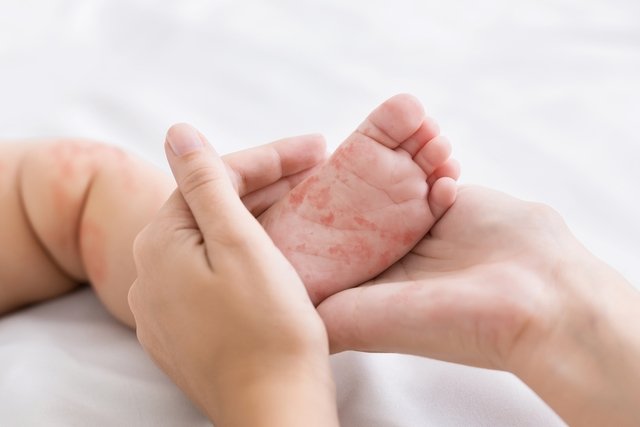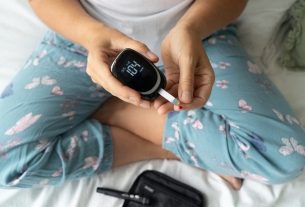Measles treatment consists of relieving symptoms through rest, hydration and medications such as Paracetamol, for around 10 days, which is how long the disease lasts.
This disease is more common in children and its treatment is aimed at controlling unpleasant symptoms such as fever, general malaise, lack of appetite, itching and red spots on the skin that can develop into small wounds.
Measles is a highly contagious disease, through droplets of saliva that spread through the air, and the period of greatest risk of transmissibility is after the appearance of spots on the skin.

How long does measles last
The duration of measles is approximately 8 to 14 days, but in most individuals it lasts 10 days. Four days before the first symptoms of the disease appear until its complete remission, the individual can infect others and that is why it is very important that everyone takes the triple-viral vaccine that protects against measles, mumps and rubella.
How to relieve measles symptoms
As there is no specific treatment to eliminate the Measles virus, treatment therefore serves to alleviate symptoms and should include:
1. Rest and drink water
Getting plenty of rest so that the body can recover and fight the virus and drinking lots of water, tea or coconut water is very important for a good recovery, also helping to prevent dehydration. See how to make flavored water by adding slices of lemon, orange or aromatic herbs.
2. Taking medications
The doctor may recommend the use of medicines to relieve fever and pain such as Paracetamol and/or Ibuprofen as long as they do not contain acetylsalicylic acid in their composition and therefore medicines such as AAS, Aspirin, Doril or Melhoral, for example, are contraindicated.
Vitamin A supplementation can be useful for children with measles as it reduces the risk of death, and is indicated in cases of deficiency of this vitamin that can be seen in a blood test or when the mortality rate due to measles is high. The dose must be taken and repeated after 24 hours and after 4 weeks.
Antibiotics are not indicated for the treatment of measles, because they are not capable of improving the symptoms caused by the virus, but they may be indicated if the doctor observes that there is a bacterial infection associated with the viral condition caused by the Measles virus.
3. Use cold compresses
Measles can cause conjunctivitis and the eyes can become red and very sensitive to light and produce a lot of secretion. To improve these signs and symptoms, you can clean your eyes with a cold compress soaked in saline whenever there is secretion and wearing sunglasses can be useful even at home.
Cold compresses can also be useful to reduce fever and to do this, place gauze wet with cold water on the forehead, back of the neck or armpits to naturally reduce the body temperature.
4. Humidify an ar
To fluidize the secretions and facilitate their removal, the air can be humidified by placing a basin of water in the room where the patient is. This care also helps to keep the larynx less irritated, relieving throat discomfort. In case of a persistent cough, the doctor may prescribe medications such as Desloratadine, for example. See the 5 ways to humidify the air at home.
Possible complications
Measles is a self-limited disease that generally does not cause complications, however, in rare cases measles can cause:
- Bacterial infections such as pneumonia or otitis media;
- Bruises or spontaneous bleeding, as the number of platelets can decrease significantly;
- Encephalitisa type of brain infection;
- Panencephalitis sclerosante subacutea serious complication of measles that produces brain damage.
These measles complications are more common in individuals who are malnourished or have some compromised immune system.
How to avoid getting measles
The best way to avoid Measles is to be vaccinated with the Measles vaccine, which is especially recommended at 12 months, with a booster dose at 5 years, but which can be taken by all people who have not yet been vaccinated.
Anyone who has taken the vaccine is protected for life and does not need to worry if there is a case of measles in a nearby region. However, anyone who has not yet been vaccinated can become infected and therefore should stay away from infected people and immediately take the vaccine at a health center.
Warning signs to go to the doctor
You should go to the doctor if you experience symptoms such as:
- Fever above 40ºC because there is a risk of convulsions;
- If the person vomits because of coughing;
- Signs of dehydration such as sunken eyes, very dry skin, crying without tears and little pee;
- If you are unable to drink liquids;
- If other symptoms appear.
These signs may indicate that the condition has worsened, requiring a new medical evaluation because other medications may be used or hospitalized to receive fluids through a vein.
Rarely does a person with measles experience complications, but these can arise if they have a very weak immune system or if the virus reaches the brain, for example, which is not common.
Learn more about measles in the following video:

Sign up for our newsletter and stay up to date with exclusive news
that can transform your routine!
Warning: Undefined array key "title" in /home/storelat/public_html/wp-content/plugins/link-whisper-premium/templates/frontend/related-posts.php on line 12
Warning: Undefined array key "title_tag" in /home/storelat/public_html/wp-content/plugins/link-whisper-premium/templates/frontend/related-posts.php on line 13




